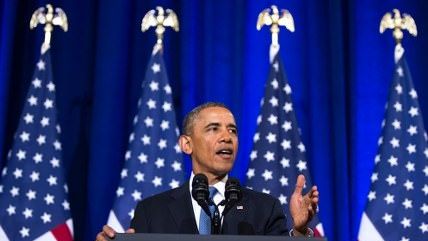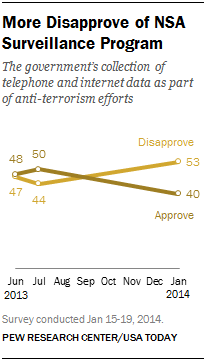Obama's Weak 'Reform' of the Surveillance State


It's never a promising sign when a politician compares presumptuous government intrusions to the risks taken by freedom fighters who put their asses on the line to fight intrusive government policies. Yet that's how President Obama launched his speech last Friday, suggesting that the National Security Agency's surveillance of communications in the United States and around the world is nothing but a continuation of the Sons of Liberty's lookout for redcoats. So, the NSA's secretive reports to administration officials are the equivalent of Paul Revere's midnight ride? But Obama didn't go quite that far.
He didn't go that far, either, in his lukewarm embrace—well, let's call it a moist, limp handshake—of the very modest reforms to NSA snooping practices recommended by his hand-picked Review Group on Intelligence and Communication Technologies. But, as you would expect from a government review committee created in reaction to public outrage over practices the government had intended to keep secret, the proposed reforms were weak tea to begin with. The committee's report (PDF) includes plenty of weasel-word lumber from which any half-clever official can construct a loophole or two. For example:
the decision to keep secret from the American people programs of the magnitude of the section 215 bulk telephony meta-data program…should be kept secret from the American people only if (a) the program serves a compelling governmental interest and (b) the efficacy of the program would be substantially impaired if our enemies were to know of its existence.
Whew. Transparency assured, right? Yeah…Not so much.
Importantly, the proposals adopted by the president allow for the continuation of the government's policy of hoovering up massive amounts of information from email, phone calls, texts, and the like, though subject to a few more rules, safeguards, and disclosures than is currently the case. This is…odd, since the report itself concludes that indiscriminately sucking up bulk data "was not essential to preventing attacks and could readily have been obtained in a timely manner using conventional section 215 orders."
That said, the light reforms could be better than nothing—so long as they're only the beginning of trimming back the surveillance state. Echoing the report, in his presidential policy directive (PDF) the president proposes more transparency, greater oversight, and a set of defined conditions under which surveillance can take place—with very specific no-nos for listening in, namely:
The United States shall not collect signals intelligence for the purpose of suppressing or burdening criticism or dissent, or for disadvantaging persons based on their ethnicity, race, gender, sexual orientation, or religion. … It is not an authorized foreign intelligence or counterintelligence purpose to collect such information to afford a competitive advantage to U.S. companies and U.S. business sectors commercially
That's swell but…the devil is in the details definitions. What's a "compelling governmental interest"?
And what, really, does it mean when the president says, "Effective immediately, we will only pursue phone calls that are two steps removed from a number associated with a terrorist organization instead of the current three"?
As a colleague asked me while we listened to the speech, "I follow Al Qaeda on Twitter. How far removed is that?"
Forget about Al Qaeda. As a senator, Obama objected to the government's "overbroad definition of domestic terrorism, which could include acts of civil disobedience by political organizations." Not much has changed since then, except that the one-time senator now administers the surveillance state which he previously opposed. Now, as then, those two steps removed could still reach awfully far, depending on what officials decide constitutes a "terrorist organization."
In fact, all of the refinements, safeguards, and increased oversight ordered by the president on a program he once found so frightening rest entirely on good-will implementation by government officials, officials who will largely be responsible for keeping each other honest in revising snooping programs they never intended for us to know about. We don't even know what all of the intended "reforms" entail since some of them are contained in a classified annex to the presidential policy directive that's supposed to ease our fears.
That's right. Whistleblower Edward Snowden shocked the world with revelations of massive, secretive spying by the NSA, and the president is going to set things right—but just how is, in part, a secret.

No doubt, the president would say, as he did in his speech last week, that "the readiness of some to assume the worst motives by our government can be frustrating." But his feigned innocence is less convincing every day. A Pew Poll conducted after the Friday gabfest found the public continues its growing disapproval of NSA surveillance: a solid 53 percent oppose the scheme, up from 44 percent last July. Far larger numbers are unconvinced that the "reforms" will increase privacy protections against snoopy officials.
Assuming "the worst motives by our government" has become the norm in the United States. But then, we did find out that the government was spying on all of our communications from a guy who had to flee the country to avoid arrest for telling us. And that spying is administered and defended by a president who was elected, in part, on the strength of assurances that he would end such shenanigans.
What are we supposed to assume?
It's encouraging that President Obama gave a little thought to Paul Revere and the Sons of Liberty in his speech, even if its main focus was grudging acknowledgement of the American public's distaste for being eavesdropped on. Maybe it occurred to him, while reading out their names, that the country he addressed has a history of turning on government officials who press their luck too far.
Perhaps, after reflection on that point, he'll give thought to real surveillance reform.
Editor's Note: As of February 29, 2024, commenting privileges on reason.com posts are limited to Reason Plus subscribers. Past commenters are grandfathered in for a temporary period. Subscribe here to preserve your ability to comment. Your Reason Plus subscription also gives you an ad-free version of reason.com, along with full access to the digital edition and archives of Reason magazine. We request that comments be civil and on-topic. We do not moderate or assume any responsibility for comments, which are owned by the readers who post them. Comments do not represent the views of reason.com or Reason Foundation. We reserve the right to delete any comment and ban commenters for any reason at any time. Comments may only be edited within 5 minutes of posting. Report abuses.
Please to post comments


With his speech I think he thought he needed to go just far enough with his vague promises to give those few civil libertarian complainers on the left an out to stop complaining and move past this. And I focus on his speech because I guaranfuckingtee you that's all he focused on. Any actual reforms didn't even make it onto the administration's back burner.
It's the FYTW speech!!
That's worked pretty well so far, hasn't it?
According to your garden-variety Obama supporter. It's working 100% of the time. And Benghazi is a fake scandal.
The IRS? What's that? Pretty sure Obo never heard about it until something about it showed up in the papers.
How in blue blazes did the administration manage to work identity politics into this? So what, you're going to gut-stomp our fourth amendment rights, but you super-pinky-promise they won't be used because of The Gay or by virtue that you're a 'Rican?
Oh, and the fucking instant I read "compelling government interest" we're done. There are no reforms, there are no limits, discussion closed.
If Paul is allowed to define Paul's compelling interest when Paul wants to do something, guess when Paul is going to find Paul's interests "compelling"? That's right, when he wants to do something.
Hey Psul, I don't know about you, but now that I know that whites and blacks will have their privacy violated equally, I'm reassured!
Ooh, Ooh, I have another question for the class... make what you will of Obama's "reforms", but talking legal turky, why would the administration offer any reforms. Wouldn't this really be the area of legislators... to, you know, reform the agencies they created and gave authority to? Yeah, I went there, I'm ending sentences in prepositions.
Wouldn't this really be the area of legislators... to, you know, reform the agencies they created
"If congress refuses or is slow to act ?."
Ah yes, the intransigence argument.
So lemme see if I got this right... hmm..hmm..hmm, something something language of Mordor...hmmm hmm... shall not be uttered here, paragraph two, hmmm hmm, great deal about a ring and a dark lord... hmm hmm, destroyed in the fires of mount doom... hmmm hmmm... ah, unless there's a compelling government interest to NOT destroy the ring of power and only use it for good.
Guess what path we're goin' down boys?
We're not goin' to Guam, are we?
Did either the President or his commission suggest that the NSA should stop sabotaging encryption software?
Have they admitted to doing so in the first place?
THIS.
There is nothing more evil than the NSA's attempts at sabotaging the security of billions of people.
Spy all you want, set the wiretaps, use the secret subpoenas. At least with these things the danger starts and ends with just one agency.
Compromise a security system, and you put a hole anyone else can exploit. Pay the developers to compromise a security system and you're making sure that hole never gets plugged.
It's especially disheartening given the positive role the NSA played in improving DES back in the 70's: http://en.wikipedia.org/wiki/D.....the_design
he isnt going to change anything ---Left wing communists love to spy on the population
Obamas is good at speech, but there are many things to do if he really want to go on the reform!